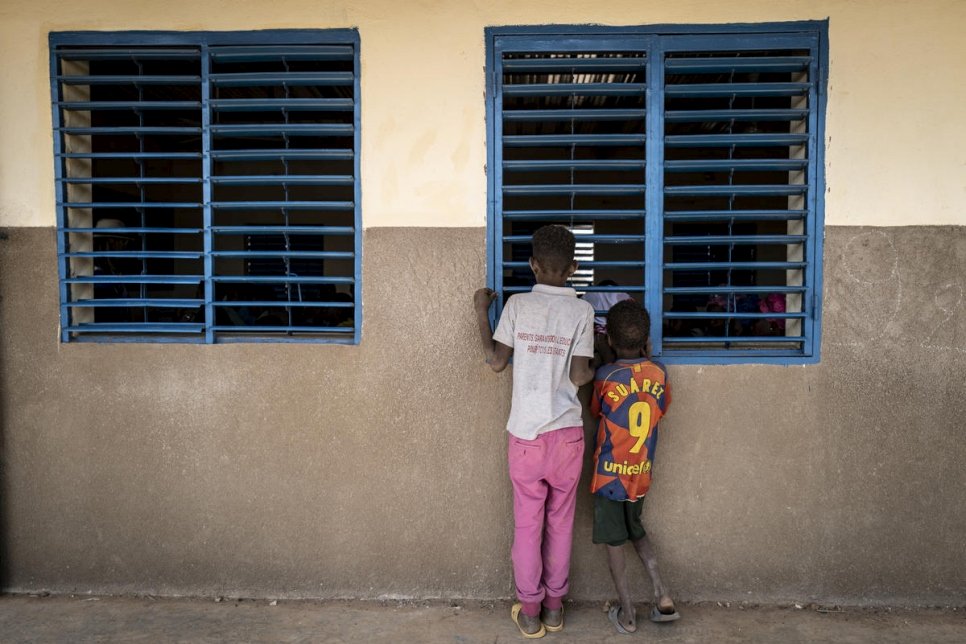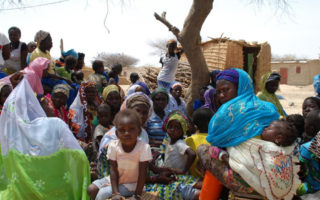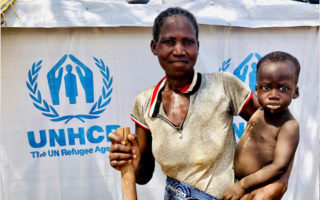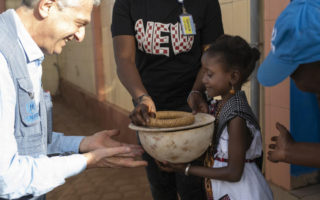
Young Malian children peek into a classroom at a school in Goudoubo refugee camp in Burkina Faso, where rising insecurity has kept teachers at home since late 2019. © UNHCR/Sylvain Cherkaoui
This is a summary of what was said by UNHCR spokesperson Babar Baloch – to whom quoted text may be attributed – at today’s press briefing at the Palais des Nations in Geneva.
UNHCR, the UN Refugee Agency, remains extremely alarmed at growing insecurity in Burkina Faso, which is driving thousands of people out of their homes every day.
As violence has spread across the Sahel region, Burkina Faso has witnessed a massive displacement of more than 838,000 people since January 2019 – a figure which keeps climbing with each passing day.
The arrival of COVID-19 has added a new element of insecurity into the mix.
Group attacks have also affected some 25,000 Malian refugees, who lived in remote camps near the border of Burkina Faso and Mali. Most of these refugees have now chosen to return home despite still facing insecurity there as well, judging it was the lesser of two evils.
Following attacks and ultimatums by armed groups, the Goudoubo refugee camp, recently home to 9,000 refugees, is now effectively empty as they have fled to seek safety elsewhere.
With the closing of school, health centre and even the camp’s security post, about half of the residents, who reached Gao, Mopti and Timbuktu regions in Mali, cited insecurity and armed attacks as the reason to leave and felt they had no other option but to return.
The remaining half have moved to locations inside Burkina Faso. Some 2,500 have joined many displaced Burkinabes in the town of Dori, where people face dire conditions, in desperate need of shelter, water and health services. Attacks around the camp also forced locals of the Goudoubo village to flee.
Insecurity has now engulfed all 13 regions of Burkina Faso. Last week, at least 32 people were killed in a string of attacks and scores of others injured.
The violence also forced UNHCR to relocate staff out of the Mentao refugee camp, near the town of Djibo, in November 2019. Access to more than 6,000 refugees since then has been sporadic, with living conditions worsening. Many refugees in the camp are also indicating their intentions to return back to Mali once restrictions ease with COVID-19.
However, the volatile security situation in Mali does not allow many to return to their places of origin. Insecurity persists and authorities have imposed a curfew as part of its COVID-19 response, which has further fuelled security and health concerns among vulnerable groups.
UNHCR, working with the Malian authorities, registered nearly 3,000 refugees in Gao, Mopti and Timbuktu regions. Panicked returnees, many with horror stories, are arriving on rented trucks or camel backs with their families.
UNHCR works with authorities and partners on the ground, providing returning refugees with shelter, relief items and cash to support their initial needs. UNHCR is also providing the authorities with the needed health and hygiene equipment as part of the response to the COVID-19 pandemic.
For more information on this topic, please contact:
- In Dakar, Romain Desclous, desclous@unhcr.org, +221 786 396 385
- In Burkina Faso, Moussa Bougma, bougma@unhcr.org, +226 253 40 522
- In Mali, Chadi Ouanes, ouanes@unhcr.org, +223 75 997 247
- In Geneva, Charlie Yaxley, yaxley@unhcr.org, +41 795 808 702
- In Geneva, Babar Baloch, baloch@unhcr.org, +41 79 513 9549
Originally published by UNHCR on 03 April 2020





